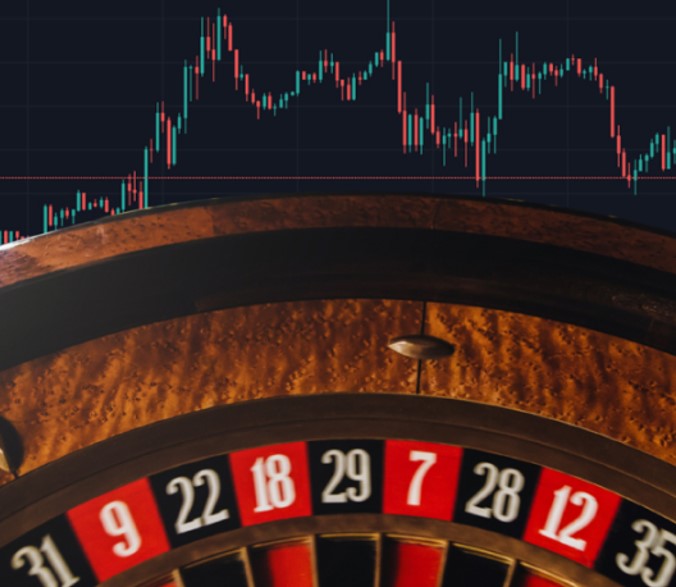If you’ve spent any time online or chatting with folks about trading, you’ve probably encountered a mountain of misinformation.
Some of it sounds convincing, but when you take a closer look, it’s like those late-night infomercials: big claims, zero results.
Let’s break down some of the most common myths you might have heard, and I’ll explain why they’re completely off the mark.
Table of Contents
1. “Trading is just gambling.”

This one gets tossed around a lot, usually by someone who’s never even opened a trading platform.
Yes, there’s risk in trading—just like in starting a business or investing in real estate. But equating it to gambling is a big oversimplification. In gambling, the odds are stacked against you from the start.
Many traders utilize an auto trading platform to implement strategies that rely on data analysis rather than chance.
A casino always wins in the long run. In trading, though, you have tools, strategies, and research at your disposal to tip the odds in your favor.
Smart traders don’t rely on luck. They study the markets, analyze patterns, and make informed decisions. It’s like comparing playing poker at a high level (where skill matters) to throwing quarters into a slot machine. Big difference.
2. “You need a ton of money to start trading.”

Nope. That might’ve been true a few decades ago, but the landscape has changed. With platforms allowing you to start with as little as $10, the barrier to entry is lower than ever.
Sure, having more capital gives you more flexibility, but starting small lets you learn the ropes without risking your life savings. The key is to start with what you’re comfortable losing—whether that’s $50, $500, or $5,000.
Small accounts are also great for experimenting. Use that as your playground to test strategies, see what works, and build confidence before scaling up.
3. “You need to be glued to your screen all day.”
This myth probably scares off more people than any other. It paints this picture of a trader as someone frantically staring at multiple screens, juggling charts, and yelling “BUY!” into the void.
The reality? You don’t have to do any of that.
There are plenty of trading styles that don’t require constant monitoring. Swing trading, for example, involves holding positions for days or even weeks. Set your strategy, place your orders, and let the market do its thing.
And then there’s automation. Many platforms let you set alerts or even automate trades. You don’t have to quit your job or give up your weekends to trade effectively.
4. “Only math geniuses can succeed in trading.”

I’m not saying math doesn’t help—it does. But you don’t need to be some kind of calculus wizard to be a good trader.
The most important skills are being able to manage risk, staying patient, and sticking to a plan. Most of the math involved is pretty basic: addition, subtraction, and some percentages. If you can calculate a tip at a restaurant, you’ve got what it takes.
What’s even more important than numbers is emotional control. FOMO (fear of missing out) and panic can destroy an account faster than any mathematical error ever could. Mastering your mindset is way more valuable than acing a math test.
5. “The market is rigged against small traders.”
Ever heard someone rant about how “the big guys always win”? It’s easy to feel like that when you see headlines about hedge funds pulling off billion-dollar trades.
But the truth is, small traders have advantages that big institutions don’t. You can enter and exit trades more easily because you’re not moving huge amounts of money. Plus, you’re free to focus on smaller opportunities that might not even be worth a hedge fund’s time.
Yes, big players have fancy tools and deep pockets, but that doesn’t mean small traders can’t win. With the right tools and strategy, you can carve out your piece of the pie.
6. “You’ll get rich quick.”
Ah, the classic myth that hooks so many beginners.
You’ve probably seen ads promising to turn $1,000 into $100,000 in a few months. Sounds tempting, right? But trading isn’t a get-rich-quick scheme. It’s more like planting a garden—you won’t see results overnight, but steady effort can pay off big time.
Most successful traders take years to hone their skills and build wealth. The ones who jump in expecting to double their money in a week? They’re usually the ones who blow up their accounts.
Patience is the secret sauce here. Focus on consistent, realistic gains rather than shooting for the moon.
7. “You need insider information to make money.”
Movies and TV shows love to dramatize trading as some shady, backroom operation where secrets are traded over whiskey and cigars.
In reality, insider trading is illegal and will land you in serious trouble. The good news is, you don’t need it.
Publicly available information like earnings reports, economic data, and price charts is more than enough to develop a strategy. Many of the world’s best traders rely entirely on information that anyone can access. It’s all about how you interpret and apply it.
8. “You should never lose a trade.”
If anyone ever tells you they’ve never lost a trade, either they’re lying or they’ve never actually traded. Losses are part of the game, plain and simple.
The key isn’t avoiding losses—it’s managing them.
Here’s what experienced traders do:
- Set stop-loss orders: These automatically close a trade if the market moves against you beyond a certain point.
- Risk only a small percentage of your account per trade: This way, one bad trade won’t wipe you out.
- Focus on the bigger picture: Even the best traders lose some battles, but they win the war by being consistently profitable over time.
9. “The more trades, the better.”
It’s easy to fall into the trap of thinking that the more you trade, the more money you’ll make. But overtrading is a one-way ticket to burnout and poor decisions.
Quality beats quantity every time. A handful of well-thought-out trades can be far more profitable than dozens of rushed ones.
Sometimes, the best thing you can do is sit on your hands and wait for the right opportunity. The market rewards patience, not impulsiveness.
10. “All you need is a winning strategy.”
Don’t get me wrong—having a solid strategy is crucial. But a strategy alone won’t guarantee success.
Why? Because the markets are unpredictable, and even the best strategy won’t work 100% of the time. Your mindset and risk management play an equally important role.
Think of it like driving a car. A great car (your strategy) helps, but if you’re reckless or don’t follow the rules of the road, you’re bound to crash.
How to Separate Fact from Fiction
There’s a lot of noise out there, and it can be overwhelming. Here are a few ways to cut through the clutter:
- Stick to reliable sources: Look for information from seasoned traders, not random social media accounts.
- Test things yourself: Open a demo account and see what works for you. Personal experience beats any advice.
- Ask questions: Join communities or forums where traders share insights and call out misinformation.
Final Thoughts

Trading isn’t as mysterious or intimidating as some people make it out to be. It’s not about luck, crazy IQ, or secret insider hacks. It’s about building skills, managing risks, and showing up consistently.
By shaking off these myths and focusing on what really matters, you’ll be miles ahead of most beginners. So take your time, keep learning, and remember: trading is a marathon, not a sprint.
